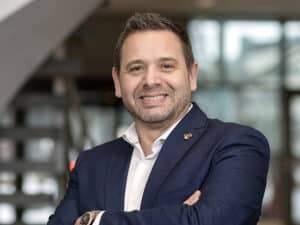
Op-Ed: A decade following Mission 31, PROTEUS makes waves
Written by Heather Ervin
Fabien Cousteau
By Fabien Cousteau, aquanaut and explorer
In an era where our planet faces unprecedented environmental challenges, our oceanic
endeavors are more crucial than ever.
In June 2014, a decade ago, my team of aquanauts and I embarked on Mission 31, the longest
science expedition to take place at Aquarius, the world’s only underwater marine laboratory,
located nine miles off the coast of the Florida Keys, and 63 feet beneath the sea.
The Mission 31 expedition broke new ground in ocean exploration and honored the 50th
anniversary of my grandfather, Jacques-Yves Cousteau’s original 30-day underwater living
experiment known as Conshelf Two. Together, my team was able to go deeper, longer and
further, with Mission 31 while broadcasting each moment live on multiple channels exposing
the world to the adventure, drama and never-before-seen wonders. For 31 straight days, we
kept the importance of the ocean in the news, classrooms, businesses and homes worldwide.
As a result of Mission 31, the equivalent of three years of scientific research was captured. More
than 70 virtual sessions were completed as a part of the mission’s STEAM-themed (Science,
Technology, Engineering, Arts & Mathematics) Skype in the Classroom program reaching over
100,000 children on all six continents. And, more than 34 billion media impressions were made,
to date, keeping the entire world engaged on the importance of the human-ocean connection.
The expedition exposed the world to new discoveries, risks and the mystique of what lies
beneath. During Mission 31, science partners Florida International University (FIU) and
Northeastern University collaborated to study climate change and the related challenges of
ocean acidification; ocean pollution with an emphasis on the effects of plastics;
over-consumption of resources with specific focus on the decline of biodiversity and
predator-prey relationships. The experience inspired me to continue searching for answers to
Earth’s most pressing issues from the ocean floor.
After the success of Mission 31, I was galvanized to reach new depths and establish
PROTEUS, the International Space Station of the ocean. By establishing a permanent
presence underwater, we will enable research to address pressing global issues and facilitate
groundbreaking discoveries.
Multiple PROTEUS installations will form a worldwide network of connected habitats
enabling aquanauts, scientists, astronauts, teachers and artists to live and work underwater in a
way not otherwise possible. “Saturation divers” will be able to stay underwater for extended
durations, driving ocean discovery and accelerating research.
By living and working at depth for longer periods, aquanauts will be able to immerse
themselves full-time in a unique environment, using fragile equipment that would not survive
the rigors of ship or shore diving, working with animals in their own environment. Results
therefore will be of much higher fidelity and can yield very different—at times groundbreaking—results. This approach will not replace other methods but will instead complement them,
working synergistically with other platforms to enhance our overall understanding and
capabilities of the Ocean.
The future of exploration entails human-machine teaming, leveraging the very best of today’s
technologies along with an aquanaut’s keen observational skills and the ability to pivot if and
when problems arise. Not only can key observations and course corrections be made much
more rapidly with a human field researcher, but it is intrinsic to human nature to want and need
to explore challenging environments in person.
Slated for deployment off the coast of Curaçao, PROTEUS is poised to become a beacon of
hope and innovation. It promises to advance our understanding of the ocean, drive new
scientific and technological developments and inspire a new generation of explorers. By
fostering a deeper connection between humanity and the ocean, PROTEUS will play a
pivotal role in our efforts to protect and sustain the natural world. I only wish my grandfather
was here to witness it.




